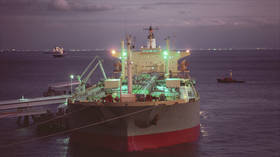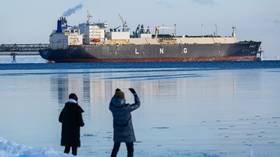G7 member buying Russian oil above Western price cap – WSJ

One of the Group of Seven (G7) nations, Japan, has started buying Russian crude oil above the $60-a-barrel agreed cap after securing a US-authorized exception, the Wall Street Journal reported on Sunday.
According to the news outlet, Tokyo, which relies heavily on energy imports, reportedly got the concession from Washington, saying it needed it to ensure access to Russian fuel. Official statistics show that, in the first two months of this year, Japan bought around 748,000 barrels of Russian oil for approximately $70 a barrel.
Tokyo joined the price cap on Russian oil imports late last year, as part of a coordinated effort to lower Moscow's oil revenues pitched by Japan’s long-time ally, the United States, and supported by the G7, the EU, and Australia. However, Tokyo exempted oil imports from the Sakhalin-2 project from the cap, stating that such a move would endanger the country’s energy security.
An official at Japan’s Ministry of Economy, Trade and Industry told the Journal that Tokyo wanted to ensure access to Sakhalin-2’s main product, natural gas, which is liquefied and shipped to Japan. “We have done this with an eye toward having a stable supply of energy for Japan,” the official reportedly said.
He explained that a small quantity of crude oil is extracted alongside the natural gas at Sakhalin-2 and needs to be sold to ensure liquefied natural gas (LNG) production continues. “The price is decided by negotiations between the two parties,” the unnamed official told the Journal.
The report pointed out that Russia accounts for nearly 10% of Japan’s natural-gas imports, most of it from Sakhalin-2, with volumes of purchases by Japan rising 4.6% last year in comparison to 2021.
The Journal also cited Japanese officials as saying it would be self-defeating to give up access to Russian LNG because Moscow could sell it to China.
Japanese Prime Minister Fumio Kishida announced late last month that the country’s companies would continue to participate in Russian energy projects on Sakhalin Island due to their importance for Tokyo’s energy security.
For more stories on economy & finance visit RT's business section













